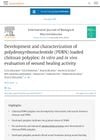1 citations,
January 2018 in “Indian dermatology online journal” Early diagnosis and genetic evaluation of ADULT syndrome are crucial to reduce stress and medical costs.
 December 2024 in “Archiv Euromedica”
December 2024 in “Archiv Euromedica” Trichoscopy is essential for diagnosing and treating autoimmune cicatricial alopecia early.
 September 2024 in “Archiv Euromedica”
September 2024 in “Archiv Euromedica” Trichoscopy is a quick, accurate, and non-invasive method to diagnose and treat non-scarring hair loss.
 December 2023 in “Rheumatology quarterly”
December 2023 in “Rheumatology quarterly” Skin changes are key for early diagnosis and treatment of rheumatic diseases.
 October 2023 in “Journal of Preventive Diagnostic and Treatment Strategies in Medicine”
October 2023 in “Journal of Preventive Diagnostic and Treatment Strategies in Medicine” Low ferritin and Vitamin D levels may cause hair loss after COVID-19.
 September 2023 in “International journal of biological macromolecules”
September 2023 in “International journal of biological macromolecules” The chitosan/PDRN polyplex improved wound healing in diabetic rats.
September 2021 in “Authorea (Authorea)” Systemic lupus erythematosus caused severe abdominal issues in a Sudanese woman.
 November 2023 in “Scientific Reports”
November 2023 in “Scientific Reports” A gene mutation in Lama3 is linked to a common type of hair loss.
 54 citations,
January 2023 in “Signal Transduction and Targeted Therapy”
54 citations,
January 2023 in “Signal Transduction and Targeted Therapy” New therapies are being developed that target integrin pathways to treat various diseases.
44 citations,
January 2013 in “BMC Dermatology” TGFβ signaling prevents sebaceous gland cells from producing fats.
 24 citations,
January 2018 in “International Journal of Trichology”
24 citations,
January 2018 in “International Journal of Trichology” Tofacitinib helped regrow hair in patients with alopecia, with few side effects.
 20 citations,
April 2021 in “Journal of Womens Health”
20 citations,
April 2021 in “Journal of Womens Health” Testosterone can help premenopausal and postmenopausal women with low sexual desire, but its long-term safety is unclear and it's not widely approved for this use.
 16 citations,
November 2020 in “PLOS ONE”
16 citations,
November 2020 in “PLOS ONE” Your lifestyle and health can affect your chances of getting COVID-19; not enough sleep, lots of exercise, and hair loss can increase risk, while washing hands, eating fruit daily, and taking vitamins A and C can lower it.
 15 citations,
October 2021 in “Frontiers in Pharmacology”
15 citations,
October 2021 in “Frontiers in Pharmacology” Natural volatiles and essential oils have health benefits and can enhance the effects of some medicines, but more research is needed to understand how they work and their possible side effects.
15 citations,
February 2021 in “Frontiers in immunology” Leptin, a hormone from fat cells, affects immune responses and can influence skin diseases and hair growth.
12 citations,
June 2023 in “International Journal of Molecular Sciences” Innovative biomaterials show promise in healing chronic diabetic foot ulcers.
12 citations,
July 2017 in “Annals of saudi medicine/Annals of Saudi medicine” More knowledge about the risks of performance-enhancing agents leads to less use in north-western Saudi Arabia.
 11 citations,
October 2021 in “Frontiers in Cell and Developmental Biology”
11 citations,
October 2021 in “Frontiers in Cell and Developmental Biology” Non-coding RNAs are important for hair growth and could lead to new hair loss treatments, but more research is needed.
 10 citations,
September 2022 in “Psychiatry and Clinical Neurosciences”
10 citations,
September 2022 in “Psychiatry and Clinical Neurosciences” Long COVID affects over half of COVID-19 survivors, causing a range of symptoms like fatigue and neurological issues, with no specific treatment yet.
10 citations,
September 2022 in “Animals” Certain genes affect udder shape in Holstein cows, important for health and milk production.
9 citations,
June 2020 in “Trials” The trial aims to test if spironolactone is an effective acne treatment for women without the side effects of current treatments.
 8 citations,
July 2021 in “Patient Preference and Adherence”
8 citations,
July 2021 in “Patient Preference and Adherence” Alopecia treatments improve life quality but side effects can lessen this benefit; better use of quality of life measures is needed.
4 citations,
December 2022 in “Al-mağallaẗ al-ʻirāqiyyaẗ li-l-ʻulūm al-bayṭariyyaẗ/Iraqi journal of veterinary sciences” Tioconazole cream is highly effective and easy to use for treating sheep dermatophytosis.
4 citations,
January 2014 in “Indian journal of paediatric dermatology” Methotrexate is effective and well-tolerated in children for certain skin conditions but requires careful monitoring.
 3 citations,
May 2021 in “Evidence-based Complementary and Alternative Medicine”
3 citations,
May 2021 in “Evidence-based Complementary and Alternative Medicine” Some traditional Chinese medicines may have anti-aging benefits and could help with hair growth, but more research is needed.
3 citations,
May 2016 in “Dermatopathology” Lrig1 could be a marker for advanced sebaceous carcinoma.
 2 citations,
February 2023 in “BJUI”
2 citations,
February 2023 in “BJUI” Urologists should monitor mental health in patients taking finasteride due to potential links to suicidal thoughts, adjusting dosage or stopping use if necessary. More research is needed to confirm if finasteride causes these thoughts.
 2 citations,
October 2022 in “Current Allergy and Asthma Reports”
2 citations,
October 2022 in “Current Allergy and Asthma Reports” Biologic therapies can cause various adverse events, but allergy/immunology clinicians can manage them.
 2 citations,
January 2021 in “Cureus”
2 citations,
January 2021 in “Cureus” A child's chronic use of Senna caused liver damage and a severe decrease in blood cells, but improved after stopping Senna and getting treatment.
2 citations,
October 2020 in “Journal of Pharmacy And Bioallied Sciences” Hydroxychloroquine and chloroquine are not recommended for COVID-19 treatment due to insufficient evidence and safety concerns.

















